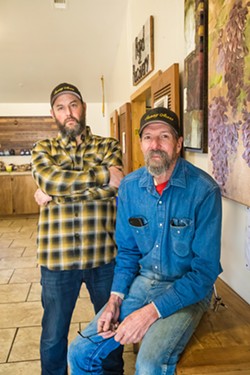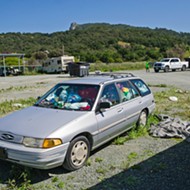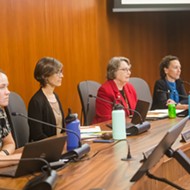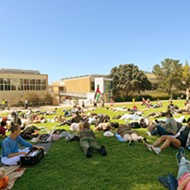[{
"name": "Newsletter Promo",
"id": "NewsletterPromo",
"class": "inlineCenter",
"insertPoint": "4",
"component": "15264767",
"requiredCountToDisplay": "0"
},{
"name": "Ad - Medium Rectangle CC01 - 300x250",
"id": "AdMediumRectangleCC01300x250",
"class": "inlineCenter",
"insertPoint": "8",
"component": "2963441",
"requiredCountToDisplay": "12"
},{
"name": "Ad - Medium Rectangle LC01 - 300x250",
"id": "AdMediumRectangleCC01300x250",
"class": "inlineCenter",
"insertPoint": "18",
"component": "2963441",
"requiredCountToDisplay": "22"
},{
"name": "Ad - Medium Rectangle LC09 - 300x250",
"id": "AdMediumRectangleLC09300x250",
"class": "inlineCenter",
"insertPoint": "28",
"component": "3252660",
"requiredCountToDisplay": "32"
}]
Evictions and water wells became major talking points in San Luis Obispo Superior Court as negotiations brewed between county officials and Sunny Acres' founder Dan DeVaul's lawyer.
On July 11, DeVaul attorney Matt Janowicz, Assistant County Counsel Jon Ansolabehere, and the president of the California Receivership Group, Mark Adams, deliberated over DeVaul's objection to the receiver's preliminary observations of the Los Osos Valley Road property. The negotiation is part of the plan of action to fix the slew of code violations that have plagued the Sunny Acres property for years.
"It appears that Sunny Acres is housing more people than is permitted in the program and more than can be properly housed and are otherwise living on the property unlawfully," the July 10 objection read. "The removal of these people would lessen the water needs, among other things."
The document added that Sunny Acres—the sober living facility that takes up half of the 72-acre property owned by DeVaul—hasn't paid rent in two years and is in breach of its lease. The rent Sunny Acres owes to DeVaul is based on the number of participants enrolled in the sober living program, according to the objection statement. It alleged that Sunny Acres management is reluctant to share the true number of people living on-site.
"[The] eviction of Sunny Acres as well as the inhabitants unlawfully living on the property would correct the violations cited by the county regarding people living in inhabitable structures," the objection stated.
However, two members of program management told New Times that they have been blocked from accessing the Sunny Acres bank account, affecting rent payment.
"The objection reads as desperation from Dan," program manager David Dieter said prior to the court meeting.
Ansolabehere also came to the participants' defense during the session. He claimed that DeVaul created the "situation" that caused code violations, and the process of fixing them should be geared toward minimizing the impact to the participants while also providing services for them through organizations like Restorative Partners.
"The property owner used those individuals as a shield against the county's health and safety laws," Ansolabehere told presiding Judge Rita Federman. "It's a little disingenuous to flippantly ask the court to remove them."
The California Receivership Group's initial July 6 report, based on the declarations of its project manager Pierce Harper and construction manager Chris Bolton, also nails down the number of Sunny Acres participants.
"Mr. Dieter advises that they often house as many as 50 men on-site but now only have 40, and he is not admitting anyone else while things get 'figured out,'" the report stated. "Of these 40 men, roughly 10 are sex offenders under penal code 290 and are reportedly complying with the probation department and local law enforcement requirements."
Judge Federman also expressed surprise at Janowicz and DeVaul's focus on evicting participants. Janowicz defended their suggestion.
"Does the property owner have to foot the bill for all those individuals when the program is not functioning as intended?" he asked.
Janowicz went on to ask for better communication with DeVaul's side going forward. He suggested that the California Receivership Group keep him in the loop on its plans to fix the code violations. So far, according to him, the receivership group has only spoken with Cherisse Sweeney—the person whom DeVaul transferred power of attorney to.
"It would be helpful for me to be involved ... to inform the property owner [about the plans] clearly moving forward," Janowicz said.
Federman agreed to having the attorney included in future communications.
The receiver's first report calls for an initial cleanout of the property and an environmental test to take place. The California Receivership Group has already received bids of $7,425 for the cleanout from 2 Mexicans LLC and $3,100 for the environmental test from Haro Inc. The appointment order for the receiver from the court authorized $50,000 as an initial fund to stem those costs.
But Janowicz and DeVaul opposed another item in the receiver's report: the two water wells that exist on the property. The old well is contaminated with E. coli and nitrates, and a new well was drilled.
"Why then is time and resources being spent on a well that is already known to be contaminated?" the objection read. "The efforts, if any, should be focused on the new well that was drilled to provide clean water and connecting to the structure."
However, Ansolabehere said that the old, contaminated well is close to the building in which participants live, making it a point of interest. The new well, though, is 1,000 feet away and still needs trenching. Since the new well can't be drawn for drinking water, yet, participants are continuing to use bottled water.
The concerned parties will regroup with an updated report on Aug. 15.
"There does seem to be [a way] that can account for everyone's interest," Adams from the receivership group said at the meeting. "I do see a path here, but I can't tell you what that is." Δ
Latest in News
Comments (2)
Showing 1-2 of 2
Readers also liked…
-

Coast Unified teachers upset over new position's salary and qualifications
Oct 20, 2022 -

SLO police identify alleged driver who hit and killed couple
Dec 22, 2022 -

When the levee breaks: Oceano residents, county officials walk a tightrope of regulations to manage Arroyo Grande Creek, which some say led to the levee's failure in January
May 18, 2023









